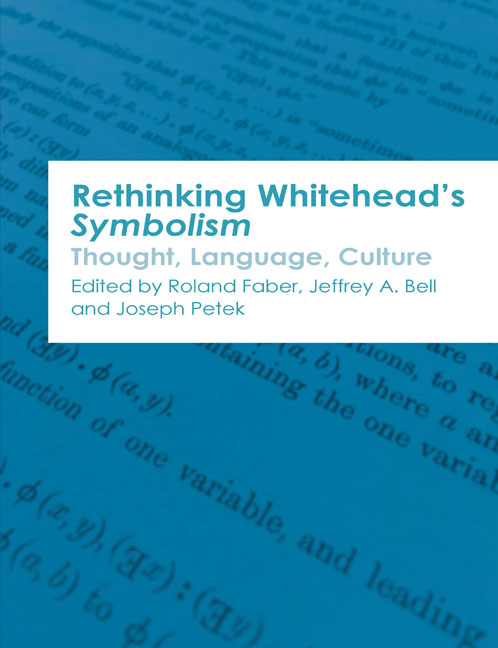Book contents
- Frontmatter
- Contents
- Abbreviations
- Introduction
- Part I Perception and Paradox
- Part II Adventures in Culture and Value
- 4 The Inhumanity of Symbolism
- 5 Reverence, Revision and Creaturely Life: Whitehead's Political Theology of Enjoyment
- 6 Ren and Causal Efficacy: Confucians and Whitehead on the Social Role of Symbolism
- 7 Avoiding a Fatal Error: Extending Whitehead's Symbolism Beyond Language
- Part III Misplaced Concreteness in Ethics and Science
- Notes on Contributors
- Index
4 - The Inhumanity of Symbolism
from Part II - Adventures in Culture and Value
Published online by Cambridge University Press: 23 June 2018
- Frontmatter
- Contents
- Abbreviations
- Introduction
- Part I Perception and Paradox
- Part II Adventures in Culture and Value
- 4 The Inhumanity of Symbolism
- 5 Reverence, Revision and Creaturely Life: Whitehead's Political Theology of Enjoyment
- 6 Ren and Causal Efficacy: Confucians and Whitehead on the Social Role of Symbolism
- 7 Avoiding a Fatal Error: Extending Whitehead's Symbolism Beyond Language
- Part III Misplaced Concreteness in Ethics and Science
- Notes on Contributors
- Index
Summary
One aim of this chapter is to protect Whitehead's thought from any charge of humanism. Throughout his work, Whitehead tries to avoid any easy dualisms which might lead us to venerate the special aspects or role of humans in the world, at the expense of giving due weight to the role of ‘stubborn fact’ (PR xiv and passim). Advocating a simple version of humanism would mean that nature has ‘bifurcated’ (CN 26–48), that humans and their unique properties are different and distinct from all other elements of the world. This is not to suggest that Whitehead was an anti-humanist, as this would also run the risk of allowing nature to bifurcate. Emphasis would be laid on the side of brute matter of fact, with the associated difficulty of establishing how meaning can be put back into a mute world which has no value of its own.
The more specific concern, which runs throughout this chapter, is that a focus on Whitehead's text Symbolism: Its Meaning and Effect runs the risk of inadvertently creating a sophisticated version of humanism. Such a humanism might not start with the human, might not even make the human central to our understandings of meaning, but it could let a version of human exceptionalism slip in through the back door – for example, if too much emphasis is placed on how language indicates the way in which humans express themselves symbolically. This is not to deny any link between humans, symbolism and language. Whitehead makes it quite clear that there is such a link. My point is that we need to be careful when approaching the relations between humans and symbolism. The main point of interest is the inhumanity involved in making us human. As Stengers puts it, it is a question of ‘what we became when we were given speech, not what was given to us by speech’.
Whitehead on Symbolism
Whitehead is very careful with his use of words, and it is worth paying attention to even slight variations in his terms. One notable example is on page 1 of Symbolism, where he states that during the Middle Ages
symbolism seemed to dominate men's [sic] imaginations. Architecture was symbolical, ceremonial was symbolical, heraldry was symbolical … But such symbolism is on the fringe of life. (S 1,emphasis added)
- Type
- Chapter
- Information
- Rethinking Whitehead’s SymbolismThought, Language, Culture, pp. 81 - 95Publisher: Edinburgh University PressPrint publication year: 2017



